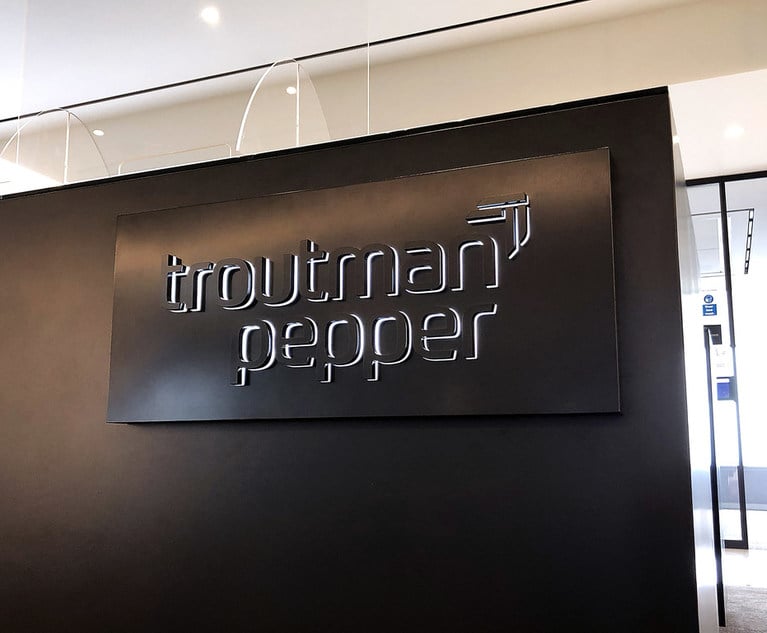Superior Court Jurisdictional Rulings Clear Way for Phila.'s First Trial Linking Talc to Ovarian Cancer
Thanks to two recent Pennsylvania Superior Court rulings upholding the "consent by registration" theory of jurisdiction, the first ovarian-cancer-related talc case in the Philadelphia Court of Common Pleas has been allowed to proceed.
October 08, 2018 at 01:21 PM
5 minute read
 Credit: SewCream/Shutterstock.com
Credit: SewCream/Shutterstock.com
Thanks to two recent Pennsylvania Superior Court rulings upholding the “consent by registration” theory of jurisdiction, the first ovarian-cancer-related talc case in the Philadelphia Court of Common Pleas has been allowed to proceed.
On Oct. 1, Philadelphia Court of Common Pleas Judge Idee Fox overruled preliminary objections by defendant Imerys Talc America in Kleiner v. Rite Aid, finding that the Superior Court's decisions in Webb-Benjamin v. International Rug Group from June and Murray v. American LaFrance from September dictate that an out-of-state company's registration to do business in Pennsylvania constitutes consent to general personal jurisdiction in Pennsylvania.
Over the past four years, state trial judges across Pennsylvania—including in Philadelphia—have split on the issue of whether consent by registration under 42 Pa.C.S.A. Section 5301(a)(2) is still valid after the U.S. Supreme Court's 2014 ruling in Daimler v. Bauman. In Daimler, the high court ruled that jurisdiction could not be exercised over a corporation in a state where that corporation was not “at home,” which the justices defined as having “continuous and systematic” “affiliations” with the state where the litigation was filed.
But in Webb-Benjamin and Murray, two different three-judge panels of the Superior Court ruled that Daimler had no impact on the consent provision in Pennsylvania's long-arm statute and that registering to do business in the state still means agreeing to the possibility of being sued in the state. Both Superior Court rulings took guidance from the U.S. District Court for the Eastern District of Pennsylvania case Bors v. Johnson & Johnson.
Litigators on both sides of the courtroom aisle have predicted that the one-two punch of Webb-Benjamin and Murray has now made it much more difficult to argue against consent by registration.
The complaint in Kleiner was originally filed in the Philadelphia trial court in January 2017 against defendants Imerys, Johnson & Johnson and Rite Aid. Johnson & Johnson removed the case to the U.S. District Court for the Eastern District of Pennsylvania in September of that year, but a district judge remanded it back to state court that October.
The suit alleges Imerys mined and sold talc to Johnson & Johnson, which used the mineral in its baby powder and “Shower to Shower” products that were sold to consumers by Rite Aid.
After the case was sent back to state court, Imerys filed preliminary objections arguing that the court lacked jurisdiction because the company was not “at home” in Pennsylvania as defined by Daimler.
But Fox rejected that argument, relying on Webb-Benjamin and Murray.
“Imerys argues that this court cannot exercise general personal jurisdiction because Imerys is not 'at home' in Pennsylvania,” Fox said. “However, the Superior Court has held specifically … that registration as a foreign association constitutes consent to personal jurisdiction notwithstanding the United States Supreme Court's ruling in Daimler.”
Fox also noted that Imerys had been a defendant in the Bors case, which both Superior Court panels relied upon for their holdings in Webb-Benjamin and Murray, and that the company had unsuccessfully argued that, post-Daimler, consent by registration was an unconstitutional violation of the due process guaranteed under the 14th Amendment.
“The district court rejected this argument, noting that '[i]n 2007, long after Pennsylvania enacted its specific notice statute and after our Court of Appeals confirmed personal jurisdiction based on registration, Imerys elected to register to do business in Pennsylvania as a foreign corporation. Imerys' compliance with Pennsylvania registration statute amounted to consent to personal jurisdiction,'” Fox said, quoting from the Bors ruling.
“The district court's reasoning is as applicable here as it was in Bors,” Fox added.
The judge also said Imerys' consent to jurisdiction went beyond just the registration itself, noting that the plaintiffs have shown that Imerys makes about $2 million per year in revenue from talc sales in Pennsylvania.
“Although these earnings are not enough to find that Imerys is 'at home' in Pennsylvania, they are evidence that Imerys' registration to do business in Pennsylvania is more than a mere formality,” Fox said.
The plaintiffs in Kleiner are represented by Nancy Winkler, Todd Schoenhaus and Daniel Sherry Jr. of Eisenberg, Rothweiler, Winkler, Eisenberg & Jeck in Philadelphia, along with Ted Meadows of Beasley Allen in Alabama.
“Both J&J and Imerys have tried to do everything they could to keep this case from being tried here, where it rightfully belongs,” Winkler said in an email. “Now that those efforts have proved futile, our clients look forward to having their case move forward to be heard by a Philadelphia jury.”
Imerys is represented by Thomas Hanson Jr. of Barnes & Thornburg in Wilmington, Delaware; Rite Aid is represented by James Robinson of Gordon Rees Scully Mansukhani in Philadelphia; and Johnson & Johnson is represented by David Abernethy of Drinker Biddle & Reath in Philadelphia.
The defense attorneys could not immediately be reached for comment on Fox's ruling.
Read More
It Just Got a Lot Easier to Sue Out-of-State Companies in Pa.
Another Mistrial Declared in J&J Talcum Powder Case
This Judge in Deadlocked Talc Trial Tried Everything to Get a Verdict, Transcripts Show
This content has been archived. It is available through our partners, LexisNexis® and Bloomberg Law.
To view this content, please continue to their sites.
Not a Lexis Subscriber?
Subscribe Now
Not a Bloomberg Law Subscriber?
Subscribe Now
NOT FOR REPRINT
© 2025 ALM Global, LLC, All Rights Reserved. Request academic re-use from www.copyright.com. All other uses, submit a request to [email protected]. For more information visit Asset & Logo Licensing.
You Might Like
View All

Troutman Pepper Says Ex-Associate Who Alleged Racial Discrimination Lost Job Because of Failure to Improve
6 minute read
Over 700 Residents Near 2023 Derailment Sue Norfolk for More Damages
3 minute readTrending Stories
- 1Conversation Catalyst: Transforming Professional Advancement Through Strategic Dialogue
- 2Trump Taps McKinsey CLO Pierre Gentin for Commerce Department GC
- 3Critical Mass With Law.com's Amanda Bronstad: 700+ Residents Near Ohio Derailment File New Suit, Is the FAA to Blame For Last Month's Air Disasters?
- 4Law Journal Column on Marital Residence Sales in Pending Divorces Puts 'Misplaced' Reliance on Two Cases
- 5A Message to the Community: Meeting the Moment in 2025
Who Got The Work
J. Brugh Lower of Gibbons has entered an appearance for industrial equipment supplier Devco Corporation in a pending trademark infringement lawsuit. The suit, accusing the defendant of selling knock-off Graco products, was filed Dec. 18 in New Jersey District Court by Rivkin Radler on behalf of Graco Inc. and Graco Minnesota. The case, assigned to U.S. District Judge Zahid N. Quraishi, is 3:24-cv-11294, Graco Inc. et al v. Devco Corporation.
Who Got The Work
Rebecca Maller-Stein and Kent A. Yalowitz of Arnold & Porter Kaye Scholer have entered their appearances for Hanaco Venture Capital and its executives, Lior Prosor and David Frankel, in a pending securities lawsuit. The action, filed on Dec. 24 in New York Southern District Court by Zell, Aron & Co. on behalf of Goldeneye Advisors, accuses the defendants of negligently and fraudulently managing the plaintiff's $1 million investment. The case, assigned to U.S. District Judge Vernon S. Broderick, is 1:24-cv-09918, Goldeneye Advisors, LLC v. Hanaco Venture Capital, Ltd. et al.
Who Got The Work
Attorneys from A&O Shearman has stepped in as defense counsel for Toronto-Dominion Bank and other defendants in a pending securities class action. The suit, filed Dec. 11 in New York Southern District Court by Bleichmar Fonti & Auld, accuses the defendants of concealing the bank's 'pervasive' deficiencies in regards to its compliance with the Bank Secrecy Act and the quality of its anti-money laundering controls. The case, assigned to U.S. District Judge Arun Subramanian, is 1:24-cv-09445, Gonzalez v. The Toronto-Dominion Bank et al.
Who Got The Work
Crown Castle International, a Pennsylvania company providing shared communications infrastructure, has turned to Luke D. Wolf of Gordon Rees Scully Mansukhani to fend off a pending breach-of-contract lawsuit. The court action, filed Nov. 25 in Michigan Eastern District Court by Hooper Hathaway PC on behalf of The Town Residences LLC, accuses Crown Castle of failing to transfer approximately $30,000 in utility payments from T-Mobile in breach of a roof-top lease and assignment agreement. The case, assigned to U.S. District Judge Susan K. Declercq, is 2:24-cv-13131, The Town Residences LLC v. T-Mobile US, Inc. et al.
Who Got The Work
Wilfred P. Coronato and Daniel M. Schwartz of McCarter & English have stepped in as defense counsel to Electrolux Home Products Inc. in a pending product liability lawsuit. The court action, filed Nov. 26 in New York Eastern District Court by Poulos Lopiccolo PC and Nagel Rice LLP on behalf of David Stern, alleges that the defendant's refrigerators’ drawers and shelving repeatedly break and fall apart within months after purchase. The case, assigned to U.S. District Judge Joan M. Azrack, is 2:24-cv-08204, Stern v. Electrolux Home Products, Inc.
Featured Firms
Law Offices of Gary Martin Hays & Associates, P.C.
(470) 294-1674
Law Offices of Mark E. Salomone
(857) 444-6468
Smith & Hassler
(713) 739-1250






